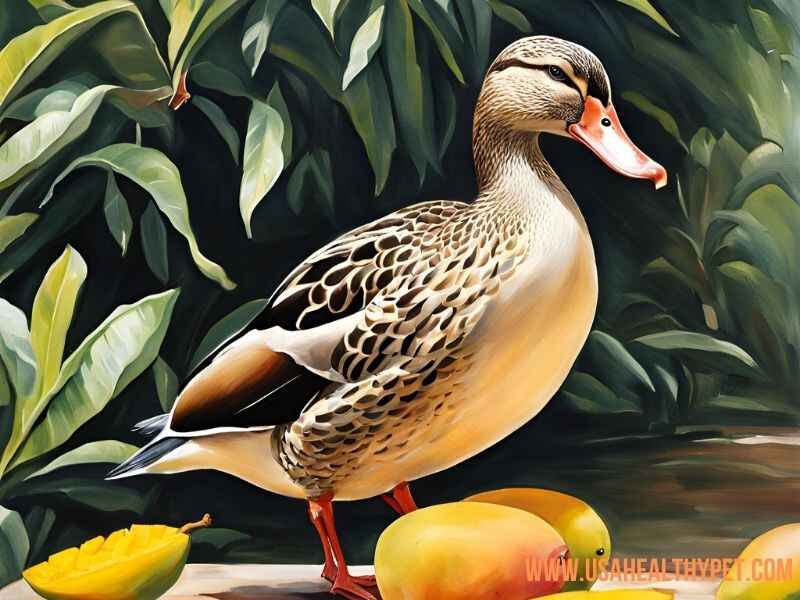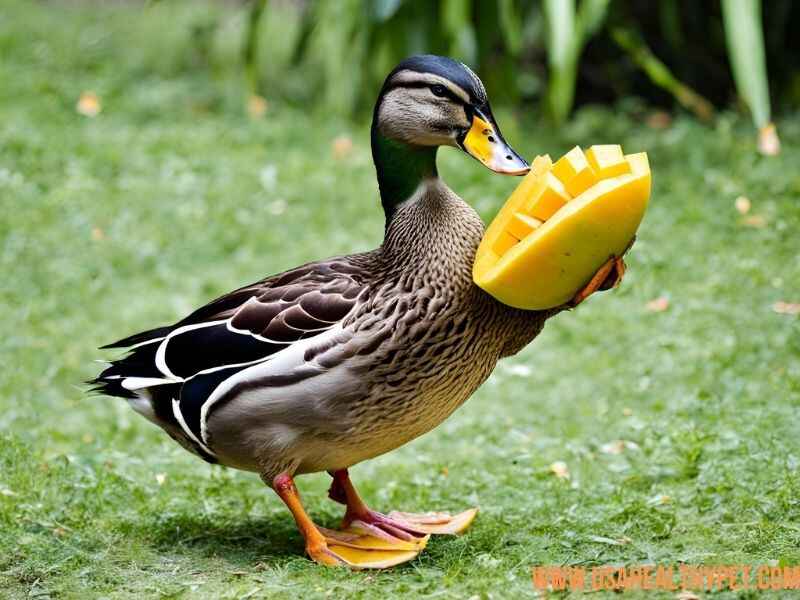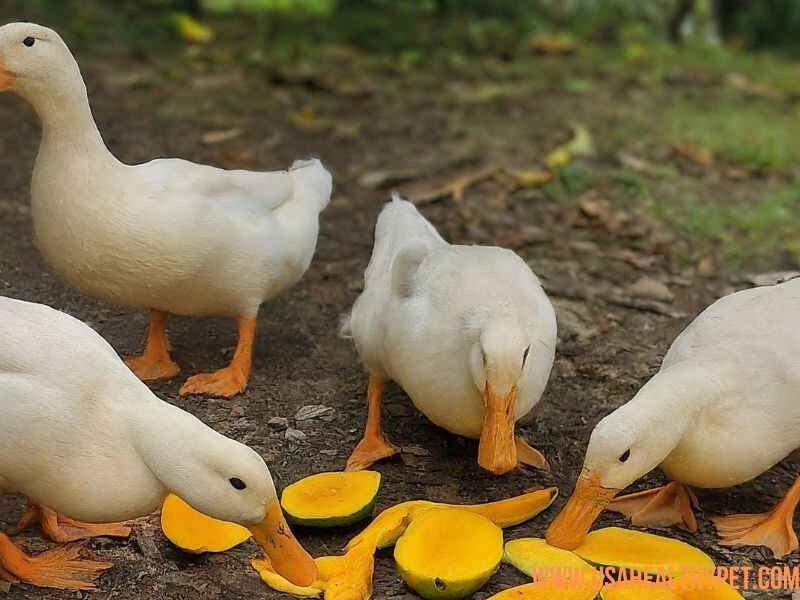As a duck owner, you’ve probably wondered, Can ducks eat mango? You’re not alone! Mango is a tropical fruit loved by humans, but when it comes to our friends, we often wonder if it’s safe for them.
Ducks are curious creatures and love to nibble on whatever looks tasty, so it’s natural to want to know if this sweet, juicy fruit is good for them too.
The short answer is: Yes, ducks can eat mango! But like anything else, there are some things to keep in mind before you toss them a piece.
Are Mangos Safe for Ducks?
The good news is that mangos are generally safe for ducks to eat. They don’t contain any harmful toxins that would pose a serious risk to your ducks.
Mangos are filled with vitamins, minerals, and natural sugars that can offer a healthy, refreshing snack.
However, moderation is key. Ducks have different dietary needs than humans, and while mango is safe, too much can cause digestive issues. Just like us, ducks need a balanced diet to stay happy and healthy!

Nutritional Benefits of Mango for Ducks
Mango isn’t just a delicious treat; it’s also packed with nutrients that can benefit your ducks. Let’s take a closer look:
- Vitamin C: Mangos are rich in vitamin C, which helps boost the immune system. While ducks produce their own vitamin C, a little extra from mango doesn’t hurt.
- Vitamin A: This is crucial for good vision, healthy skin, and feathers. Ducks will benefit from the beta-carotene found in mango, which is converted into vitamin A.
- Fiber: Mango contains fiber that can aid digestion, helping your ducks maintain a healthy gut.
- Natural Sugars: The natural sugars in mango provide a quick energy boost without the harmful effects of processed sugar.
It’s not just a tasty snack—it’s a nutritious one too!
A study from the Journal of Avian Medicine and Surgery explains that ducks benefit from a diverse diet, and small amounts of fruit like mango can supplement their nutritional needs. Fruits provide ducks with vitamins and antioxidants that support overall health. However, these treats should be given in moderation because a duck’s primary diet should consist of grains and protein-rich foods.
Is Mango Skin Safe for Ducks?
Here’s where things get a bit tricky. While the flesh of the mango is safe, the skin can be a little harder to digest. Some ducks may nibble on it without issues, but others might struggle with the tougher texture.
To avoid any risk of choking or digestive discomfort, it’s best to remove the skin before feeding mango to your ducks.
Think of it like peeling an apple before eating it—just an extra step to ensure your ducks can enjoy their treat without any problems.
Can Ducklings Eat Mango?
Like adult ducks, ducklings can enjoy mango, but with a few more precautions. Their digestive systems are more sensitive, so you’ll want to introduce mango slowly and in very small amounts.
Start with tiny, soft pieces to ensure they can chew and digest it properly.
Remember, ducklings need a diet rich in protein to grow strong and healthy, so mango should only be an occasional treat, not a staple.

How Much Mango Can Ducks Eat?
While mango is packed with nutrients, it should only make up a small part of your duck’s overall diet. A good rule of thumb is to treat mango as an occasional snack, not a daily meal.
Try giving your ducks a small slice of mango a few times a week, mixed in with their regular feed. Too much fruit can lead to digestive issues, including diarrhea, due to the high sugar content.
Dr. Sarah Bronstein, a poultry veterinarian, advise that while ducks can safely eat mango, it’s crucial to avoid overfeeding them sugary fruits. “Mango is a healthy snack for ducks because it’s high in vitamins A and C, which support their immune system and skin health. But fruit should never replace their main diet, which should consist of high-quality duck pellets or grains.
Preparing Mango for Ducks: Best Practices
So, how exactly should you prepare mango for your ducks? Here’s a simple guide:
- Peel the mango – Remove the skin to avoid any digestion problems.
- Cut it into small pieces – Ducks can’t chew food the way we do, so cutting mango into bite-sized pieces makes it easier for them to eat.
- Remove the seed – Ducks can’t eat the hard seed in the center, so make sure to discard it.
Prepping mango this way will allow your ducks to enjoy their snack safely!
Can Ducks Eat Dried Mango?
While dried mango might seem like an easy alternative to fresh fruit, it’s not the best option for ducks. Dried fruit often contains added sugars and preservatives that aren’t good for their health.
Dried mango is harder to digest, which can cause choking or other digestive issues.
If you want to give your ducks mango, stick to the fresh kind!
What About Mango Seeds?
Mango seeds are off-limits for ducks. They’re too large and hard, posing a choking hazard. Plus, ducks simply can’t digest them. Always remove the seed before giving mango to your ducks to keep them safe.
Alternatives to Mango for Ducks
While mango is a great snack, variety is the spice of life! Other fruits that are safe and healthy for ducks include:
- Blueberries
- Strawberries
- Watermelon (without seeds)
- Grapes (cut in half)
These fruits offer different nutrients and can be a fun way to mix up your ducks’ diet.

Fruits You Should Avoid Feeding Ducks
Not all fruits are created equal when it comes to feeding your ducks. Some fruits can be harmful or even toxic. Here are a few to steer clear of:
- Avocados – These contain persin, which is toxic to ducks.
- Citrus Fruits – Oranges and lemons can cause digestive issues due to their acidity.
- Unripe Bananas – They are tough to digest and can cause blockages.
What Happens If a Duck Eats Too Much Mango?
If your duck eats too much mango, they might experience some digestive upset, like diarrhea or stomach discomfort. The natural sugars can also lead to a quick spike in energy followed by a crash.
If you notice your duck isn’t feeling well after eating too much mango, simply reduce the amount next time and make sure they’re getting plenty of their regular feed.
Signs of a Healthy Duck Diet
Wondering how to tell if your ducks are eating well? Here are a few signs of a healthy duck diet:
- Bright, shiny feathers
- High energy levels
- Regular egg production (for female ducks)
- Consistent droppings (not too watery)
If your ducks are thriving, you’re likely doing a great job balancing their diet!
Final Thoughts: Adding Mango to Your Duck’s Diet
So, can ducks eat mango? Absolutely! It’s a safe, nutritious, and delicious treat when given in moderation. Just be sure to peel it, remove the seed, and cut it into bite-sized pieces. Like any treat, mango should be just one part of a balanced diet, not the main course.
Remember, ducks love variety, so feel free to switch things up with other safe fruits. Your ducks will thank you with their happy quacks and healthy appearance!
FAQs
1. Can ducks eat mango peels?
It’s best to avoid giving mango peels to ducks, as they can be tough to digest.
2. Is mango good for ducklings?
Yes, but only in small amounts. Start with soft, tiny pieces for their sensitive digestive systems.
3. Can ducks eat mango seeds?
No, mango seeds are too hard and pose a choking hazard. Always remove them.
4. How often should I feed my ducks mango?
Mango should be an occasional treat, given a few times a week in small portions.
5. Can ducks eat dried mango?
It’s not recommended due to the added sugars and tough texture, which can be hard for ducks to digest.
